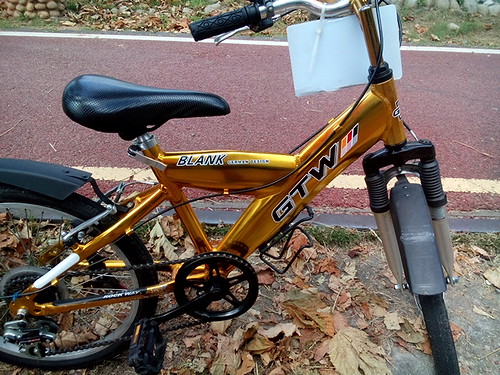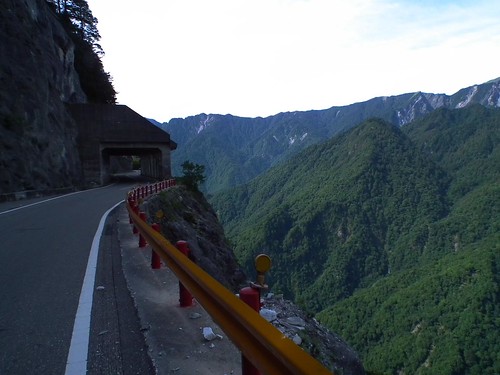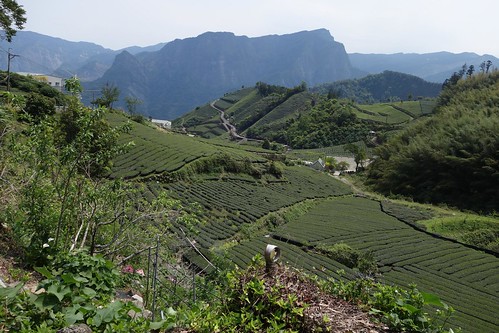Awesome cyclist Nathan Miller rides the side roads of the side roads up Yangmingshan.
At the Far Eastern Sweet Potato, J Michael
provides an excellent description of the police protests and the Dapu Demolition protests:
We all knew it was going to happen eventually, that efforts over three years by residents and their supporters, lawyers, journalists and academics to prevent a local government thug from destroying their homes would likely fail, but when the outrage was actually perpetrated on Thursday, the cold, hard reality hit home. On that day, as hundreds of people protested in front of the Presidential Office, the bulldozers rolled in and razed people’s homes in Dapu (大埔), Miaoli County, pulverizing wood, concrete, dreams, lives lived, memories — and faith in people’s ability to rectify government abuse through legal and peaceful processes.
More and more, Taiwanese are realizing that harsher, perhaps more extreme measures will be needed to unhinge a government that makes a travesty of democracy and rule of law while enriching itself and its cronies at the expense of ordinary citizens.
J Michael observes that the county government
hacked on the activists and protesters, while taking out ads in major newspapers denigrating the protests and claiming a need to take the last 4 homes. He concludes:
It takes a lot to push Taiwanese to take non-peaceful measures, but from everything that has happened in recent months, and with the crime of Dapu perhaps serving as a catalyst, I believe we may soon cross a line where more direct — perhaps even violent — action will be taken. It’s always easy to regard individuals like the Rice Bomber as extremists, terrorists even, but how can we not agree with their tactics when years of rational efforts, abiding by legal and democratic rules, are simply ignored by those in power, by crooks who undo the very fabric of Taiwan’s democracy in the process of seizing valuable land to fatten their bank accounts, perhaps in expectation of the day when Taiwan will relax its regulations on Chinese purchase of land here?
Conclusions like that first sentence occur when history disappears from the discussion (and when you live in
the Chinatown Bubble Taipei). The Taiwanese are not and have never been a peaceful people. In fact the 1990s and 2000s version of the "peaceful Taiwanese" is an illusion born of a rising economy and democratic legitimacy -- the last two decades have been totally anomalous. For all the rest of history, Taiwanese have been violent, ornery bastards much giving to redressing wrongs via group violence. Yea, verily, we still live on the island of "every three years a revolt...," where powerful individuals operated private armies, where villages were protected by sworn gangs of bravos, where aborigines fought against outside powers for two centuries...
Not only that, but these things go in cycles. Stay here long enough, and you'll hear again and again that such and such as case will catalyze a new movement. Anyone remember the DuPont case? Remember when the farmers locked up downtown Taipei for two days in 1988? When fisherman shut down the petroleum industry for three weeks over a pollution incident near the Linyuan Petrochemical Plant? How about them Wild Lilies? What's going on now is tame by comparison to what went on at the end of the 1980s. When Hau Pei-tsun became premier, he went after the social activists, farmers, anti-nuke activists, and others advocating progressive, human-centered values. He jailed many, but in the long run, he lost. Thankfully.
In the 1990s street protests "stopped" for a variety of reasons. The government acquired genuine legitimacy via real democracy. Activist groups became formal associations and organizations that gained traction, most illusory, within the system. And so on. We've been living in a period of relative calm for the last twenty years in which public protest is normalized and part of the System even while ostensibly opposed to it. Even though the total number of protests skyrocketed throughout the 1990s, everyone viewed this period as a calm one. This calm is totally anomalous in terms of Taiwan history.
Lurking in the background of why Dapu and these other cases probably won't catalyze anything is Taiwan's artificially low land tax. Had a long chat with an old friend and wise observer of Taiwan affairs who pointed out a couple of interesting things. First, the complete absence of the courts. They have no power to enforce injunctions and are not a meaningful part of the process of adjudicating cases like the Dapu Demolition mess. In the US the government would bring its land assessments, and the individuals whose land is being threatened with them, and compensation -- real compensation that took into account something like the actual market value of the land -- would occur. And both parties would comply.
In Taiwan, the government simply announces that it will take the land and it pays a pittance in compensation. Why does it pay a pittance? Because the assessed value of the land is used to determine how much is paid -- and as I have noted in several long posts (
for example), that value hasn't changed since 1987. Landowners can delay this outcome via protests, but because there are no courts with the power to issue and enforce injunctions, they can't stop it. Hence when courts do step in, they are ignored by the government, which routinely breaks its own laws in pursuit of tracts of land for developers to make big bucks on.
Work it out: this low assessed value means that land-owners in Taiwan pay far lower taxes than they should, with all the pernicious effects of such a policy, ranging from broke local governments to real estate functioning as a tax shelter for the wealthy. Thus, the government gives land-owners a tax subsidy, until it comes time to take the land, and then it pays too low a figure.
For the compensation system to change, and land-owners to get fair value,
the assessed value would probably have to rise. Given that low assessed values help the rich and help the government, and no one who owns land wants to pay higher taxes on it, how is that compensation scheme, which is at the heart of many of these protests, going to change? I suspect that most land-owners consider their risk of being punished by the System to be low, while they reap the benefits of low land taxes.....
The heartless savagery of the government towards those whose land it takes has overshadowed this key issue: no one protests because if the System changes then they will all have to pay higher taxes. The participation of a few high profile students in protests has overshadowed the fact that the vast majority of students aren't protesting -- they are too busy struggling to survive in the brutal economy their parents have created for them. People look at the
Jhunan land seizures or the Dapu demolition, and say to themselves "whew, thank god it wasn't me."
Moreover, the land seized in Dapu was for (another needless) science park. Most residents of a place, upon being told that a science park was being bestowed on their area, would probably be quite happy. The Taiwanese retain their developmentist orientation: development = good, and buildings and factories and roads = development. Science parks mean business opportunities and rising land values for the vast majority of individuals around the park. No doubt local onlookers pity those who lose their homes (who wouldn't?), but this pity is tempered with the knowledge that wealth opportunities may arise. Once again, acting on their behalf means taking a hit in the pocket book. This is especially true because Taiwanese are part of extended families and there are usually family members getting benefits from local investments. That is why local government officials in cahoots with land development companies attack activists for hurting development, because that resonates with many locals whose incomes are, after all, a third of those in Taipei.
Yet another reason nobody wants the land laws looked at too closely is that Taiwan's weird, lax land laws permit powerful local groups with local political influence, like local temple organizations, to steal the land of others without compensation. Another friend of mine described to me about how his family is in the process of losing land to a local temple. The temple association simply occupied his family's land and began building on it, because it wasn't being "used." "Unused" land can be legally seized and then used (yes, there's a process for it), and then it becomes the user's land after a few years. When my friend's family attempted to get building permits so they could "use" their own land and stop the process, mysteriously, they couldn't get them from the local government. Again, social groups that might work to change the way land laws and land usage work in Taiwan benefit from the current system. Why should they change it?
Finally, the laws and land taxes aren't going to change because President Ma was installed precisely to prevent such change from occurring. The Ma Administration has been a total success, if you are not an ordinary mortal. Perhaps a DPP administration might be more amenable to progressive change, but I am pessimistic on that score.
I could go on, and talk about the problems of empathy with the Other in local society, but that's probably enough....
If you want an issue that might drive widespread public protests, look at the coming food prices problem. Rising food prices helped trigger the Arab Spring,
for example. Taiwan is almost completely dependent on imported food. As humans heat the earth, warming-induced droughts are going to become normal, along with food scarcity, which means rising global food prices. At the moment, the cost of food relative to income is low in Taiwan, but that will change over the next couple of decades..... especially as incomes are failing to keep pace with economic growth.
_______________________
[Taiwan] Don't miss the comments below! And check out my blog and its sidebars for events, links to previous posts and picture posts, and scores of links to other Taiwan blogs and forums!


